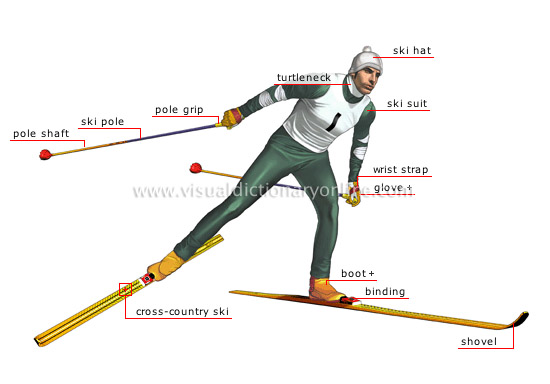cross-country skier
Athlete who practices cross-country skiing; this athlete takes part in various individual (classic, freestyle, pursuit, sprint) and team (relay) events.
boot 
Lightweight flexible boot that provides good ankle mobility; the skating step requires a more rigid boot than the traditional boot.
binding 
Device of variable form in which the skier places the toe of the boot; it allows the ski to move as one with the skier.
shovel 
Front end of the ski; its upward curve cuts through snow and helps to avoid catching an edge.
cross-country ski 
Long board designed to glide over a snow-covered surface; light and narrow, it has a relatively pronounced camber between the shovel and the tail.
pole shaft 
ski pole 
Metal or composite fiber rod with a handle and a basket; the ski pole is used for maintaining balance and thrusting.
ski suit 
Skintight one-piece garment that reduces air resistance; it is lightweight and allows heat generated by the skier to be released.
turtleneck 
Knit fabric top with a high collar formed of ribbing that folds over around the neck; it has no closing mechanism.
pole grip 
glove 
Covering for the hand and wrist that protects them against cold and against chafing by the pole handle; it is thinner than an alpine ski glove.
wrist strap 
Strap that is attached to the pole grip and worn around the wrist to prevent the skier from losing a pole when sticking it into the ground.
ski hat 
Headgear made of a tubular piece of fabric folded back to form a double layer; its top is sewn and sometimes features a pom-pom.












